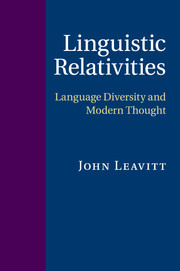Book contents
- Frontmatter
- Contents
- Preface
- Introduction
- 1 A passage to modernity
- 2 One reason, one world, many monads
- 3 The world at war with reason: Britain and France in the eighteenth century
- 4 Multiplicity and the Romantic explosion
- 5 Essences and universals through the nineteenth century
- 6 Boas and the linguistic multiverse
- 7 Linguistic relativity: Sapir, Lee, and Whorf
- 8 The other side of the mirror: a twentieth-century essentialism
- 9 The rise of cognition and the repression of languages
- 10 The return of the repressed
- Conclusion
- Notes
- References
- Index
8 - The other side of the mirror: a twentieth-century essentialism
Published online by Cambridge University Press: 04 April 2011
- Frontmatter
- Contents
- Preface
- Introduction
- 1 A passage to modernity
- 2 One reason, one world, many monads
- 3 The world at war with reason: Britain and France in the eighteenth century
- 4 Multiplicity and the Romantic explosion
- 5 Essences and universals through the nineteenth century
- 6 Boas and the linguistic multiverse
- 7 Linguistic relativity: Sapir, Lee, and Whorf
- 8 The other side of the mirror: a twentieth-century essentialism
- 9 The rise of cognition and the repression of languages
- 10 The return of the repressed
- Conclusion
- Notes
- References
- Index
Summary
The most common accusation levelled against the Boasians and their successors has been that they were “culturalists” who believe that every culture is a seamless and sealed whole, fully integrated and impermeable from outside: this is essentialism, a cardinal sin for the last few decades. How many times have we heard, since the 1980s in particular, that North American cultural anthropology takes the internal homogeneity of cultures for granted, consistently minimizing personal agency and differences of class, race, and gender within cultures, and equally consistently underestimating the role of hybridization and colonial penetration? In the more restricted domain of language, the Boasians are presented as seeing thought as trapped and determined by language. Whorf in particular, as we will see in detail in the next chapter, is accused of linguistic determinism and conceptual relativism.
It is salutary in this regard to compare the Boasian movement, which to some degree does look back to Humboldt, with a parallel and contemporary movement in Germany, that of Neohumboldtian linguistics. This was a true essentialism, and by contrast shows to what degree Boasian anthropology and linguistics were not.
Philosophical and philological precursors
The immediate precursors to Neohumboldtian linguistics can be found in some German philosophers and literary historians of the early twentieth century. In the early 1920s the philosopher Ernst Cassirer (1874–1945) propounded and promoted a Herder–Humboldt stream in philosophy and linguistics. The first volume of his Philosophy of Symbolic Forms (1923 [1953]), which deals with language, was enormously influential.
- Type
- Chapter
- Information
- Linguistic RelativitiesLanguage Diversity and Modern Thought, pp. 154 - 164Publisher: Cambridge University PressPrint publication year: 2010



